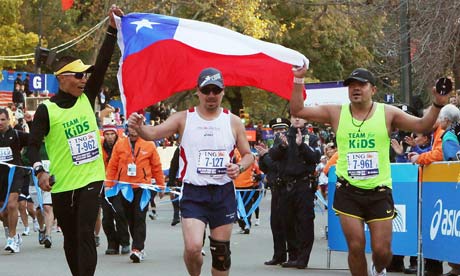Paris Marathon organizers will lay energy-harvesting tiles across the course on Sunday to ensure not all the effort expended by the race’s 40,000 runners goes to waste.
The flexible tiles made from recycled truck tires will span a portion of the Champs Elysees for about 25 meters (82 feet) of the 42.2-kilometer course, according to Pavegen Systems Ltd., the U.K. maker of the tiles. Each footstep generates as much as 8 watts of kinetic energy, which is fed back to batteries that can charge display screens and electronic signs along the route, the company said.
Schneider Electric SA (SU), the race sponsor, aims to eventually make the Paris Marathon an event that generates energy rather than consumes it, Aaron Davis, the company’s chief marketing officer, said in Pavegen’s statement. London-based Pavegen aims for its tiles to help cut carbon emissions and boost energy efficiency in cities around the world in the future, it said.
“Imagine if your run or walk to work could help to power the lights for your return journey home in the evening,” Pavegen Chief Executive Officer Laurence Kemball-Cook, who invented the technology, said in the statement. It’s “a viable new type of off-grid energy technology that people love to use and which can make a low-carbon contribution wherever there is high footfall, regardless of the weather.”
Pavegen declined to say how much energy the tiles will produce because there is a competition for the public to guess. Schneider Electric will donate an extra 10,000 euros ($12,850) to charity if generation tops 7 kilowatt hours. That’s enough to run a light bulb for about five days, according to Pavegen.According to this article, it was unclear immediately after the race whether the 7 kWh goal had been met, but I nevertheless applaud the race organizers and the company for their creativity.
It's of course way too early to know if this technology is realistically scalable or viable, but it's clearly a step in the right direction. The more energy we can harvest from our own activities, the less we have to "produce" or mine or burn. I'm hopeful that this is a method that can catch on and become economical enough to achieve wide acceptance.
[Bloomberg]













